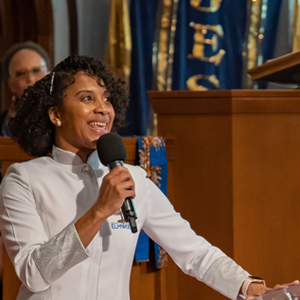COPING WITH COVID-19: A Senior Pastor’s Perspective
July 30, 2020 | Alumni, Being Church in the Time of COVID, Community, Public, Spiritual Life


The COVID-19 crisis continues to impact the Princeton Theological Seminary community. The coronavirus pandemic has reshaped the face of ministry in many different ways, and community members are offering windows into their day-to-day lives. We hope you find comfort and hope as you read about tips, techniques, and testimonies from members of our campus and alumni community.
Rev. Maria Crompton, MDiv ’05, shares her experience ministering during the pandemic as senior pastor of Elmwood United Presbyterian Church in East Orange, New Jersey.
Q: How has the COVID-19 pandemic changed your ministry?
A: COVID-19 has changed my ministry in ways that I could not have imagined or predicted. If you would have told me a year ago that ministry in 2020 would include no in-person worship, preaching weekly to an empty sanctuary, only streaming our Sunday services on our church’s website and through Facebook Live, Zoom Bible studies, ministry meeting conference calls, pastoral visits/counseling sessions via FaceTime, and socially distant weddings and funerals, I would not have believed you. Yet, this is precisely what ministry in the midst of COVID-19 entails for me and for pastors all across this country.
Q: What does a typical day (or week) for you look like during the pandemic?
A: During the week, my day begins at 4:00 a.m. This is the time I begin preparing for our church’s daily prayer call, which begins at 7:00 a.m. I started this call in March as a way of connecting with our members during the pandemic. It has since become a staple for our congregation, especially our seniors who are unable to connect to the church’s online service on Sundays. After the call, I switch from pastor to parent. As the mother of two school-aged children, the remainder of my morning is spent making sure that my children are up, showered, dressed, fed, and Zoom ready for their online classes. The afternoons and evenings are when I prepare for Sunday worship, make pastoral calls, respond to emails, check in with staff, prep for Bible study, meet with ministry leaders and church committees, and participate in clergy calls with my Presbytery. At some point during the week, I find time to go into the sanctuary to pre-record my sermon. During this time I have been asked to lead and participate in several webinars and record sermons for other churches.

A: Adjusting how we do ministry during COVID-19 has not been easy. However, this time has provided an opportunity for us to re-envision worship and re-imagine what it means to be the church. This has been a source of joy and excitement for our ministry. Worshipping virtually has opened us up to new possibilities for worship. Through the use of technology we have been able to create worship experiences that are new and meaningful. In addition, this time has allowed our church to reach people that we would not be able to reach if we were meeting in the church building. Our virtual worship services are viewed by people all over the world. Our daily prayer call averages 120 callers from across the country, including Illinois, North Carolina, and Georgia. Since moving our Bible study to the Zoom platform, we have been able to engage members who we were unable to engage when we were meeting in person. This includes our seniors who do not feel comfortable driving at night as well as millennials and Gen-Zers.
The way that we have been able to support our community during this time has also been a source of joy for our congregation. Every week we distribute prepared meals and groceries to families that have been adversely impacted by the pandemic.
Q: What have been the hardships?
A: COVID-19 has made the ministry of presence virtually impossible. Strict social distancing guidelines prevent me from being present with my members during the most difficult moments of their lives. It was hard not being allowed to visit with my members, but this time also afforded me the opportunity to re-image what it means to care for my congregation.
I also found it challenging to balance ministry with marriage and motherhood during this time. COVID-19 not only had an impact on my church and ministry, it also impacted my family. In the midst of trying to find ways to “show up” and be present for my congregation, I had to be just as intentional about “showing up” and being present for my husband and children.
Q: How are you doing?
A: I am in a much better space now. At the start of the pandemic, I was anxious, overwhelmed, and over-functioning. I was putting unnecessary pressure on myself to keep the church going and a lot of my energy was being spent trying to maintain the church’s “normal” routines. Today, I have accepted that nothing is normal. As a matter of fact, nothing will be “normal” again and I am OK with that. I am engaging in better self-care practices, setting boundaries, and taking time to re-imagine what post-pandemic ministry will look like at Elmwood United Presbyterian Church.





